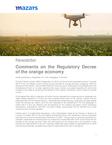
Comments on the Regulatory Decree of the orange economy
Through Decree number 1669 of September 12, 2019, the Government regulated numeral 1 of article 235-2 of the Tax Statute, which contains the tax benefits for orange economy companies. With the issuance of this decree -and provided that the Financing Law is not declared unconstitutional by the Constitutional Court (or at least regarding this issue)- clarity is provided regarding the terms and conditions to be able to access the tax benefit for this industry, consisting of seven years of exempt income.
A first aspect that calls our attention is that the Decree indicates that orange economy companies are "legal entities taxpayers of income tax and complementary taxes of the ordinary regime that are domiciled within the Colombian territory". Indicating that orange economy companies are legal entities under the ordinary tax regime, and not only corporations (as established in the first paragraph of Article 235-2 of the Tax Statute) may be beneficial for the creative ecosystem (since Colombian associations, corporations and other non-profit entities could access the tax benefit) but it could contravene the rule that regulates.
Another point, of fundamental importance, is the interpretation made by the Decree of literal b) of numeral 1 of article 235-2 of the Tax Statute according to which "the companies must be constituted and start their economic activity before December 31, 2021". This provision, in previous draft decrees, had been interpreted as meaning that only companies incorporated after 2019 could access the tax benefits of the orange economy. Now, the same decree in its recitals and in the regulation of the employment requirements to be met, expressly states that legal entities incorporated prior to 2019 may access the benefit, provided they meet the requirements set forth in the decree.
Regarding the minimum employment requirement, the Decree provides a table containing a number of employees per range for all industries where they must hire a minimum number of people depending on their gross tax income in UVT in the respective fiscal year. Thus, companies that have from 0 to 6,000 UVT in gross tax income will be obliged to hire 3 employees, while companies that have income from 65,001 to 80,000 UVT will have to hire 8 employees. This is positive, as it applies to all sectors linked to the creative economy and provides enough clarity to be able to budget and make a cost-benefit analysis of accessing the tax benefit of exempt income for 7 years.
Regarding the process of submitting the application for the investment project and obtaining the administrative act of conformity or non-conformity, the Decree clearly establishes the requirements to be met and the dates on which they will be processed. Perhaps the most important issue in this matter is the term of thirty (30) working days imposed by the Decree to the Ministry of Culture, following the opinion of the Orange Economy Committee, to issue the administrative act of conformity or non-conformity. This provides certainty and legal security to those who embark on the task of creating a creative enterprise whose cash flow depends, to a great extent, on having its income exempted.
Finally, the Decree establishes that those assets that are integrated to the patrimony of the orange economy company through mergers, spin-offs or any other type of reorganization will not count as investment. The above in consideration that "investments must correspond to new investments" that comply with the provisions of the Law and this Decree. This rule does not make much sense, since what the legislator wanted was that there should be important investments to promote the creative sector, regardless of where they come from.
This type of restrictions will mean that businessmen who have assets in other companies will have to take them out via loans for investment in companies of the creative sector, thus generating -ad infinitum- accounts receivable and payable. There remains the doubt, also, if the investment made through contributions in money, kind or industry is taken as a reorganization for the effects of this clause, subsisting then the mutual as the only option to finance the companies of the creative sector.


